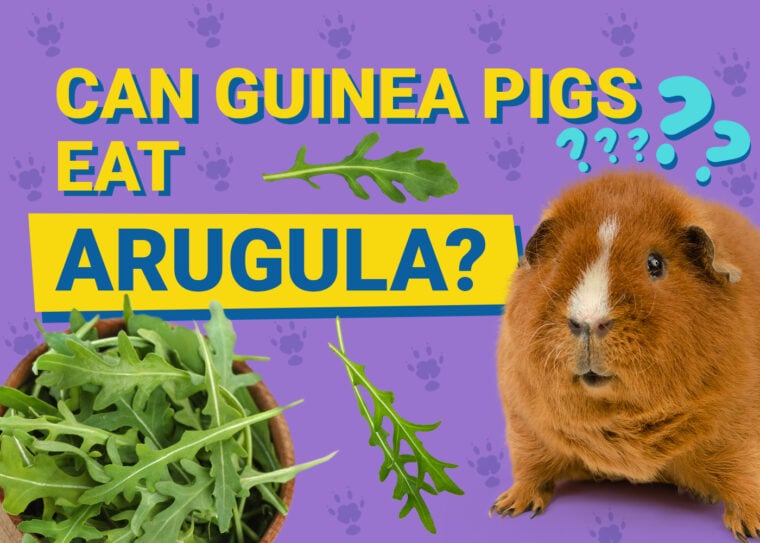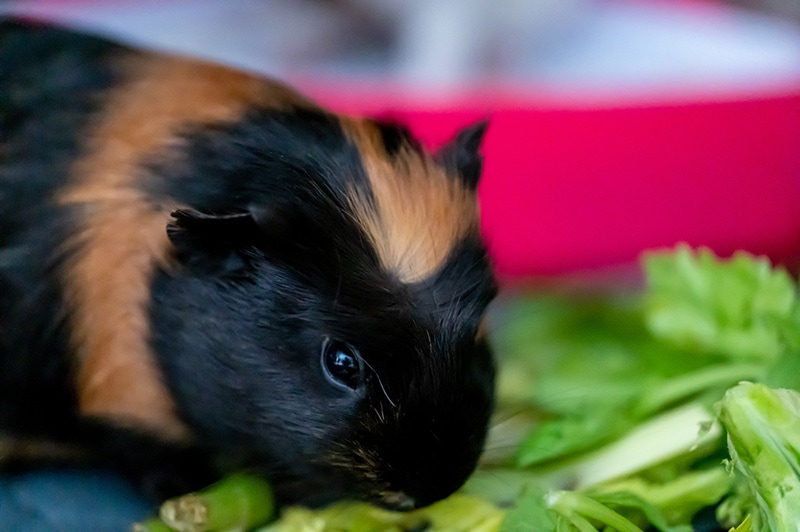
Click to Skip Ahead
The adorable charm of guinea pigs has cemented their status as one of the most popular pet rodents in the world. They’re perhaps best known for chewing on hay all day, but they’re also known to perk up when offered other fruits and vegetables. This makes their owners wonder if certain other foods are safe for them to consume.
Arugula, also known as rocket, is a popular edible leaf vegetable known for its distinct bitter and peppery flavor. If you’re wondering if it’s safe to provide your pet with arugula, the good news is that arugula is safe for guinea pigs to consume in moderation.
Read on as we explore this vegetable in greater detail!
A Guinea Pig’s Diet
Guinea pigs are herbivores that do best on a pelleted diet made specifically for them and an unlimited amount of high-quality hay. Examples of appropriate hay for guinea pigs include timothy, orchard, grass, and oat hay. Hay, along with pellets, should form the overwhelming bulk of their diet (approximately 80–90%). In addition, they require a daily serving of fresh leafy vegetables. Guinea pigs should have access to fresh, clean drinking water at all times.
Suitable treats for guinea pigs include some fruits and grains. However, these should only comprise about 5–10% of their daily intake on days when they’re offered and should only be considered as treats, not a main part of their diet.
The reason why fresh vegetables are considered important for guinea pigs is because they lack the ability to make their own vitamin C and require it in their diet. The vitamin C requirement of an adult guinea pig that isn’t breeding is around 10 mg/kg/day (milligrams per kilogram per day).
Though many commercial guinea pig diets are fortified with vitamin C, they often deteriorate rapidly (especially if the pellets are stored improperly). The same applies to vitamin C added to a guinea pig’s drinking water. Vegetables are, therefore, considered a great source of vitamin C and have a healthier nutritional profile than most fruits (which is why they are preferred over fruits).
This is where arugula comes in, as it is a vegetable that may offer your guinea pig some vitamin C. However, to better understand the value of this vegetable, its nutritional information must be carefully examined.

Arugula Nutritional Analysis
Per 100 grams of raw, fresh arugula, the key nutritional takeaways are as follows:
From the nutritional breakdown of arugula, it’s fairly obvious that while the vegetable does have vitamin C, it isn’t necessarily high when compared to some other vegetables, which we will explore shortly.
The main component of arugula is water, which renders it relatively safe but also not necessarily great for a guinea pig either.
Of concern is the availability of relatively high amounts of calcium, especially when compared to vitamin C. Though a necessary micronutrient, excess calcium can often lead to bladder stone issues in guinea pigs. Therefore, while arugula is safe for guinea pigs to consume in moderation as an occasional treat, it’s definitely not a vegetable you want to offer them too much of.
Feeding Your Guinea Pig Arugula
If you want to give your guinea pig some arugula, ensure that you buy fresh arugula and thoroughly wash it before offering just a few leaves (2–3 should suffice) to your guinea pig. Remember that vegetables shouldn’t form most of your guinea pig’s diet, and with better vegetable options out there, you shouldn’t look to feed your guinea pig too much arugula.
It is best just to offer it once a week or once every two weeks if needed. If your guinea pig doesn’t fancy the taste of this vegetable too much, it’s not something you should worry about, and in such cases, it’s okay not to include it in their diet. The steam of arugula is safe for guinea pigs to consume as well.

Better Vegetable Alternatives for Guinea Pigs
Many vegetables are safe for guinea pigs to consume; however, it’s best to stick with vegetables that offer them the much-needed vitamin C. Some of the best vegetables for guinea pigs and their vitamin C concentrations (milligrams per 100 grams) are as follows:
Other safe-to-consume vegetables with slightly lower vitamin C than the ones mentioned above include:
When feeding your guinea pig, it’s best to offer them a cup of mixed vegetables on a daily basis. At the end of the day, uneaten vegetables should be discarded, and the vegetable bowl should be thoroughly rinsed before being used the next day. All vegetables should be offered to your guinea pig raw and thoroughly washed.

Summary
Arugula is safe for guinea pigs to consume in moderation. However, it doesn’t pack the nutritional punch of other vegetables. If your guinea pig enjoys the texture and flavor of arugula, a few leaves offered with their daily mix of vegetables should be perfectly fine weekly or bi-monthly.
Given the importance of vitamin C in their diet, you should ideally look for better vegetables to offer your guinea pig. Questions about your guinea pig’s nutritional status should be discussed with your veterinarian.
- See Also: Can Guinea Pigs Eat Cheerios?
Featured Image Credit: Sea Wave, Shutterstock








